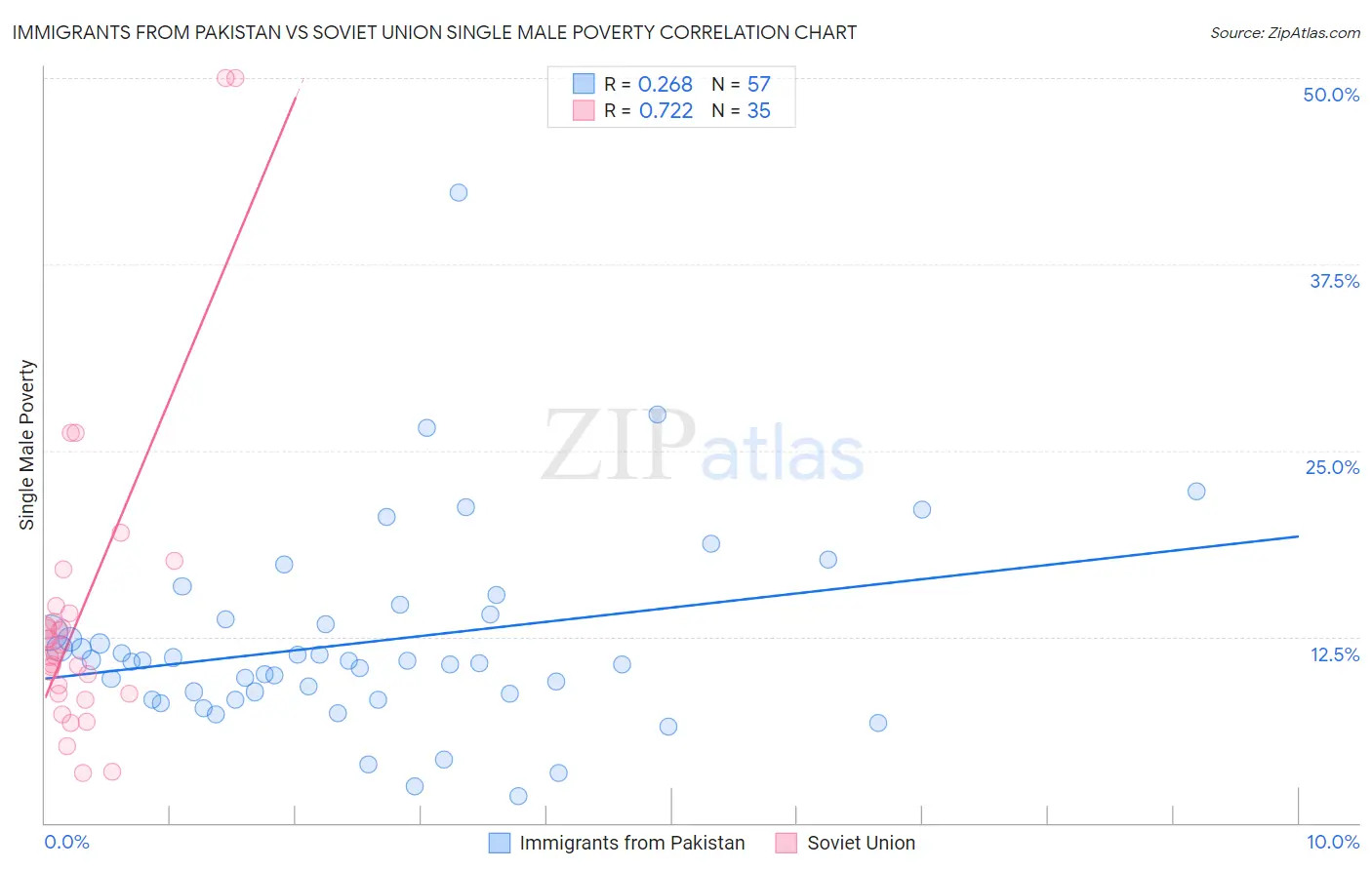Immigrants from Pakistan vs Soviet Union Single Male Poverty
COMPARE
Immigrants from Pakistan
Soviet Union
Single Male Poverty
Single Male Poverty Comparison
Immigrants from Pakistan
Soviet Union
11.2%
SINGLE MALE POVERTY
100.0/ 100
METRIC RATING
22nd/ 347
METRIC RANK
11.5%
SINGLE MALE POVERTY
100.0/ 100
METRIC RATING
39th/ 347
METRIC RANK
Immigrants from Pakistan vs Soviet Union Single Male Poverty Correlation Chart
The statistical analysis conducted on geographies consisting of 256,771,473 people shows a weak positive correlation between the proportion of Immigrants from Pakistan and poverty level among single males in the United States with a correlation coefficient (R) of 0.268 and weighted average of 11.2%. Similarly, the statistical analysis conducted on geographies consisting of 42,355,679 people shows a strong positive correlation between the proportion of Soviet Union and poverty level among single males in the United States with a correlation coefficient (R) of 0.722 and weighted average of 11.5%, a difference of 2.3%.

Single Male Poverty Correlation Summary
| Measurement | Immigrants from Pakistan | Soviet Union |
| Minimum | 1.8% | 3.3% |
| Maximum | 42.3% | 50.0% |
| Range | 40.5% | 46.7% |
| Mean | 12.1% | 14.0% |
| Median | 10.9% | 11.5% |
| Interquartile 25% (IQ1) | 8.5% | 8.7% |
| Interquartile 75% (IQ3) | 13.8% | 14.1% |
| Interquartile Range (IQR) | 5.3% | 5.4% |
| Standard Deviation (Sample) | 6.7% | 10.3% |
| Standard Deviation (Population) | 6.6% | 10.2% |
Demographics Similar to Immigrants from Pakistan and Soviet Union by Single Male Poverty
In terms of single male poverty, the demographic groups most similar to Immigrants from Pakistan are Asian (11.2%, a difference of 0.090%), Bolivian (11.2%, a difference of 0.21%), Indian (Asian) (11.3%, a difference of 0.41%), Maltese (11.3%, a difference of 0.43%), and Ethiopian (11.2%, a difference of 0.44%). Similarly, the demographic groups most similar to Soviet Union are Sri Lankan (11.5%, a difference of 0.090%), Immigrants from Singapore (11.4%, a difference of 0.15%), Immigrants from Serbia (11.4%, a difference of 0.20%), Immigrants from South Eastern Asia (11.4%, a difference of 0.24%), and Immigrants from Ethiopia (11.4%, a difference of 0.27%).
| Demographics | Rating | Rank | Single Male Poverty |
| Ethiopians | 100.0 /100 | #20 | Exceptional 11.2% |
| Asians | 100.0 /100 | #21 | Exceptional 11.2% |
| Immigrants | Pakistan | 100.0 /100 | #22 | Exceptional 11.2% |
| Bolivians | 100.0 /100 | #23 | Exceptional 11.2% |
| Indians (Asian) | 100.0 /100 | #24 | Exceptional 11.3% |
| Maltese | 100.0 /100 | #25 | Exceptional 11.3% |
| Immigrants | Japan | 100.0 /100 | #26 | Exceptional 11.3% |
| Immigrants | China | 100.0 /100 | #27 | Exceptional 11.4% |
| Immigrants | Asia | 100.0 /100 | #28 | Exceptional 11.4% |
| Immigrants | Egypt | 100.0 /100 | #29 | Exceptional 11.4% |
| Iranians | 100.0 /100 | #30 | Exceptional 11.4% |
| Immigrants | Iran | 100.0 /100 | #31 | Exceptional 11.4% |
| Immigrants | Eastern Asia | 100.0 /100 | #32 | Exceptional 11.4% |
| Immigrants | Vietnam | 100.0 /100 | #33 | Exceptional 11.4% |
| Immigrants | Ethiopia | 100.0 /100 | #34 | Exceptional 11.4% |
| Immigrants | South Eastern Asia | 100.0 /100 | #35 | Exceptional 11.4% |
| Immigrants | Serbia | 100.0 /100 | #36 | Exceptional 11.4% |
| Immigrants | Singapore | 100.0 /100 | #37 | Exceptional 11.4% |
| Sri Lankans | 100.0 /100 | #38 | Exceptional 11.5% |
| Soviet Union | 100.0 /100 | #39 | Exceptional 11.5% |
| Immigrants | Korea | 100.0 /100 | #40 | Exceptional 11.5% |